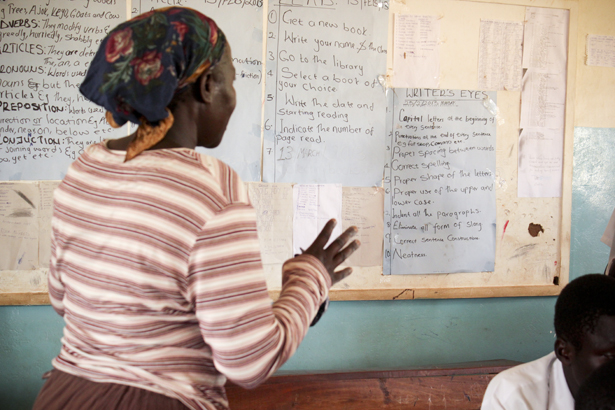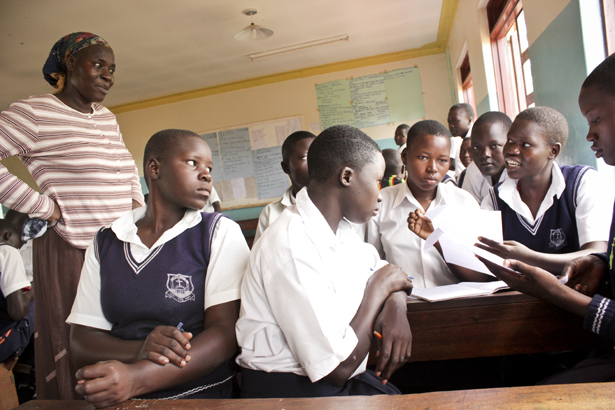The brightly painted walls of the classroom are showing signs of wear: paint chipped, smudges from the hundreds of sweaty hands and the dry season that whips storms of red dust up from the roads to coat trees, grass and buildings. Rows of wooden benches seat high school students, dressed smartly in their matching uniforms. Florence takes her place at the front of the classroom to teach a lesson on functional writing.
In January, Florence traveled to the U.S. with Invisible Children Uganda’s Reciprocal Teacher Exchange. She spent time with an American host family, partner teaching at a school in Colorado in an open exchange of ideas and culture. What was her favorite part of Teacher Exchange?
“The creation of friendship,” says Florence. “Building mutual understanding between countries.”
Now back in Uganda, Florence has been eager to put the new insights gained into practice. She has been creating teaching aids to hang on the walls of the class, and is working at making the students feel more free and engaged.
Reviewing the homework from the previous lesson, Florence asks students questions to remind them how much they really know. They are learning to write meeting minutes. Very practical, mundane even. But Florence seems bound and determined to spice it up with as many illustrations as possible.
“For modern meetings, you plan it in a way that will not bore the members,” Florence cautions them to keep their meetings brief. “When a boy and girl are courting, how long does it take to share the important information? The first 10 minutes – facts. After that? Hmmm….”
Laughter.
She’s a bit of a comedian.
Meetings are integral to life in Uganda, and students are learning how to navigate those meetings. Recording the meeting minutes is important because those records can be used in legal proceedings. For example, in a land rights dispute, you would want to have a good, dependable record of your meeting with local elders to discuss your rights to a piece of land.
At the end of the class, one of the students shares how she feels about being a student at Keyo Secondary School.
“I like to tell you that we really love Madame Florence” says Esther, a young student who has excelled at bead-making as a means of paying for her school fees. She has been part of Florence’s student empowerment program and has the admiration of her teachers for her discipline, hard work and confidence. “We love our school.”
Florence has a soft spot for girls at risk for dropping out of school. While having children graduate from school is the goal, realistically she knows that a number of the girls will not be able or permitted to finish, for a variety of reasons. To help them out, she is teaching them various livelihood skills so that they will be self-sufficient enough to earn a living. The program has recently opened to include boys as well.
While Florence came back from the U.S. with new ideas for teaching, she also found things to appreciate about her Ugandan classroom.
“There is more opportunity for interaction with teachers because technology doesn’t get in the way,” Florence explains.
The lesson on meeting minutes ends. I sit smiling in the back of the class, waiting for a bell to ring and send all the students on to their next assignment. But no, in Uganda it’s the teacher that moves to the next class. A little embarrassed, I gather my things and chase after Florence, who has already made herself at home in the next class.

Florence refers to the teaching aids she made after participating in the Reciprocal Teacher Exchange.

Think people should hear about this?